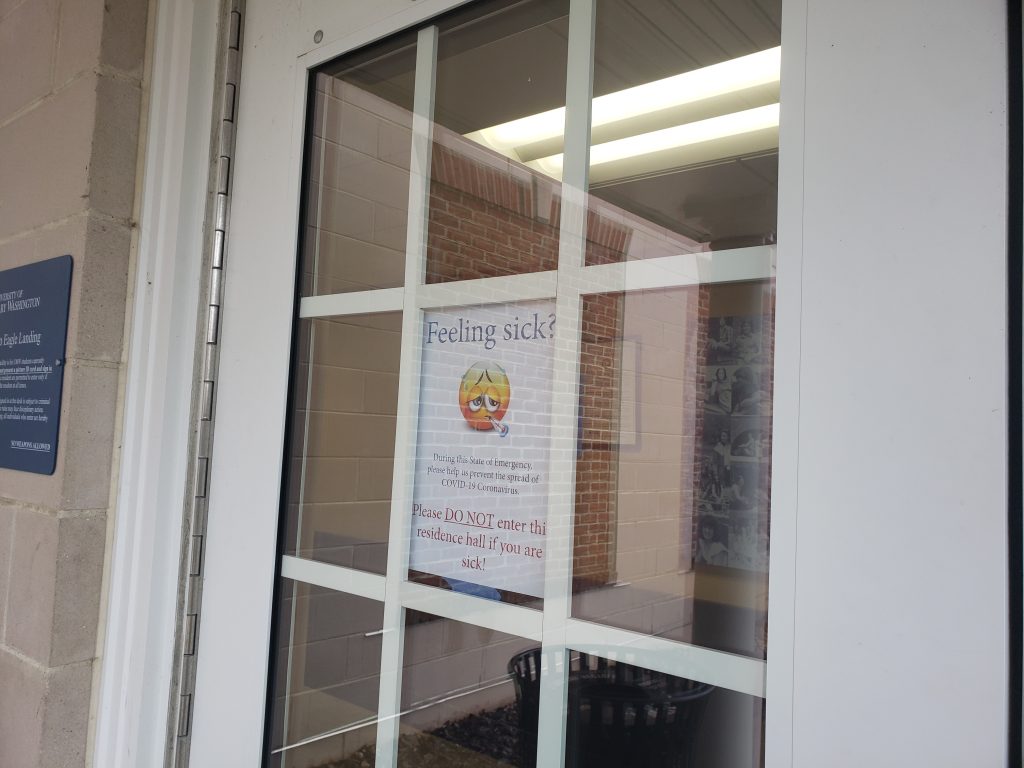Students expect reimbursement following loss of housing and meal plans
4 min read
Campus reminds students to stay safe as they work through changing policies and actions. (Alicen Hackney | The Blue and Gray Press)
By ALEXANDRA LEWIS
Staff Writer
Amid the chaos of vacating campus and transitioning home, I can’t help but wonder what will happen to us financially, as a school and as students. The notification from President Troy Paino on March 17 about classes remaining online mentioned the University assessing individual students for refunds or credit based on their housing and dining contracts. At this point, it’s unclear when students will find out more details about this, and how comprehensive the refund will be.
“It’s common knowledge the school is struggling financially. We’re a small school that keeps paying for building construction and renovation. I’m glad the school is looking into reimbursement and/or credit for next semester’s meal plans and housing costs, although I’m not expecting much from that,” said junior historic preservation major Mason Schultz.
According to UMW Fast Facts, 55 percent of students, which is 2,240 of the 4,400 undergraduates, live on campus. Multiplying this number by a rough estimate of $2,500 per on-campus student comes to $5.6 million. This is not factoring in commuter students or the individual analysis of each student and is merely an estimate of how much the school could be looking at in reimbursement or credit. It also does not factor in the 2,160 students who do not live on campus but may still be utilizing a meal plan.
In reference to refunds, Jaime Cañas, a senior psychology major said, “As a returning student, I think that a credit would be more beneficial. It would be very easy for a refund to become spending cash.”
I am also returning in the fall to finish the last six credits needed for my degree and find that credit going towards that would be more beneficial than a refund. I think that loan forgiveness of however much money a student would be otherwise credited would be best. “Loan forgiveness would be nice, but loans are through the federal government, so I doubt they’d take those extra steps,” said Shultz.
For graduating students, reimbursement would be the more practical option, as they are unable to take credit because they are not returning. This is where the option of loan forgiveness could come into play, however, as that includes outside sources, reimbursement would be more efficient for the school.
However, some students are paying out of pocket and not using loans, or just need the money now due to instability caused by COVID-19. “A refund would be most helpful because I now have to pay rent and need the money up front,” said Nicole Ford, a junior history and education major.
Herein lies the new problem of students who are now having to pay rent as they move off-campus. Having the unexpected financial responsibility of now having to fund a college payment plan along with rent and other living expenses, when jobs are closing and limiting hours, could severely impact students in numerous ways.
Emily Saunders, a senior English creative writing major said, “I just think it’s important that students and faculty be covered for the time that we will no longer be on campus, using things like meal plans and campus housing, or losing jobs because of the change. So yes, I do think there’s some responsibility there for the school.”
At the University of Virginia, President James Ryan said, “The University will offer assistance to students on financial aid who need help in returning to their homes,” which is something UMW should be offering and publicizing as well. Our university has students from 34 states and 38 countries and last minute travel fees can become very expensive very quickly. Leaving March 11 to have to return to campus in April to pack up a room can be detrimental to some families.
“Being an out-of-state student the gas money is rather expensive. It takes a whole tank of gas just to get home, and another whole tank to get back,” Schultz said. For Schultz, who lives in North Carolina, the trips to and from campus can begin to add up. Students living in states further away or internationally may be facing similar problems.
Ford said, “For international students… it’s hard for them to just get on a plane home. There should at least be some financial help for them to have temporary accommodations if they aren’t allowed to stay on campus.”
It says a lot that even in times of pandemonium for all, UMW students are putting an emphasis on how this is affecting more than just themselves. By opening a dialogue about other financial needs, even if it’s in small groups, I’m seeing new ways that UMW has created a community that cares for one another.When looking into housing and meal plan refunds or credits, I hope that the travel expenses for some students is also looked at and refunded. Any bit of money back helps, especially as college debt continually increases. I’m glad UMW is looking into reimbursements and credit for their students, however, I hope all factors are considered. Travel, housing, meal plans, returning or graduating, financial need, loans, payment plans, out of pocket: it’s more than just on or off-campus.


